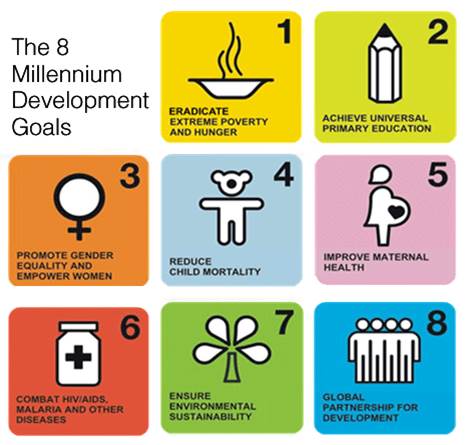The Millennium Development
Goals
towards Women’s Empowerment
T
he Millennium Development Goals (MDGs) have been one of the most successful global anti-poverty movements in human history. We are now less than 1,000 days from the target date of 2015 for achieving the MDGs. As this deadline is approaching, we can highlight the progress that has already been achieved in most of the target areas despite the adverse impact of the global economic and financial crisis. Several important targets have already been or will be met by 2015, assuming continued commitment by national governments, the international community, civil society and the private sector. At the same time, many items on the agenda are lagging behind.
The Millennium Development Goals Report 2013 gives us a clear indication where our efforts must be directed in the days before the deadline. In that respect the third millennium goal which states "Promote gender equality and empower women" draws our attention. Unfortunately, gender based inequalities in decision making power persist. Whether in the public or private sphere, from the highest levels of governments to households, women continue to be denied opportunities equal to men’s to make decisions that affect their lives. Gender equality cuts across other MDGs and is not only a goal in its own right but also plays a pivotal role in meeting all the other goals.
The struggle for women’s empowerment originated in demands voiced by grass roots associations of developing countries for increasing women’s capacity to become self-reliant and take control of their own lives. This approach stresses the importance of developing the capabilities that would empower women to take advantage of opportunities and to make decisions that would influence their lives.
Women’s access to paid employment is an indication of their integration into the market economy. As women benefit from more regular income, they are more likely to gain self-confidence, achieve greater autonomy and exercise authority in the household and in their personal lives.
During the last few decades, the issue of women’s entrepreneurship as a prerequisite for household-level poverty alleviation, national economic development and women’s empowerment has gained recognition. It is now being viewed as a journey out of poverty and march towards equality. Studies have proven that entrepreneurship, in the form of a small or medium size enterprise, can indeed empower women and, in course of time, fundamentally transform power relations within the society, transforming it into a place where women can provide leadership. However, in the past, women’s entrepreneurship in many developing countries has gone very little beyond small informal business ventures which only ensures survival for women and their families.
Women’s economic empowerment is a prerequisite for sustainable development of the society and its pro-poor growth. It requires sound public policies, holistic approaches and long-term commitment. Additionally, gender-specific pers-pectives must be integrated at the design stage of policy and programming. Women must have more equitable access to assets and services; infrastructure programs should be designed to benefit the poor.
Nowadays, women-owned businesses comprise up to 38% of all registered small businesses worldwide. The number of women-owned businesses in Africa, Asia, Eastern Europe and Latin America is growing rapidly and that growth entails a direct positive impact on job creation. All over the world we observe that many initiatives are being taken to empower women so that their participation in the field of entrepreneurship increases at a fast rate. q
Ana Paula De Marino
admarino@devalt.org